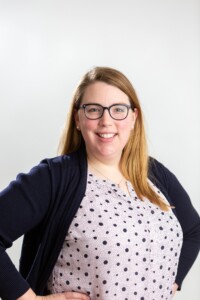Christina Hudson Kohler graduated from ESF in 2011 with a B.S. in Environmental Studies, Policy, Planning, and Law—an academic focus that came from deep within. The farm she grew up on was the first in Central New York to be put into farmland preservation. “One of the core memories I had as a child was land use and the process of preserving green space, so I looked at schools where I could study policy. That brought me to environmental studies, policy, planning, and law, and that brought me to ESF,” she says.
While at the College, Kohler thought she’d either like to manage a national park or work in Washington, D.C. Instead, after graduating she returned to the 500-acre family farm in Elbridge, New York. Hudson Egg Farms is a year-round operation that provides eggs locally in Syracuse, and as far as New York City and New Hampshire. They partner with the Food Bank of Central New York through the Nourish New York program.
Kohler’s ESF education prepared her for her job on the farm. “Agriculture is heavily regulated, and someone has to manage all the OSHA and USDA paperwork,” she explains. “All my work ties back to ESF and knowing regulations and working with local and state governments—even the federal government, because we are a USDA facility and have to maintain different standards to keep our certifications.”
Many of Kohler’s other contributions to the farm were influenced by ESF. Hers is the only egg farm in New York that has a wastewater treatment plant, whose product is one step away from clean drinking water. They compost it with chicken manure for use by organic farmers and others as the price of fertilizer
rises. Says Kohler, “At ESF, I did an internship at Metropolitan wastewater treatment plant on Hiawatha Boulevard, and that helped me advocate for the wastewater treatment plant option on our farm. We could have put in a lagoon for that water and avoided a lot of expense.”
As the farm expands, the family leases land out for crop work. They choose lessees who rotate crops and preserve hedgerows where birds and wildlife thrive. They use paper rather than Styrofoam cartons and fix broken pallets rather than throwing them out. She’s even able to protect her farm from avian flu. “You can’t stop birds from migrating, so it’s a question of how you interact with the environment. Because of ESF, I can understand at a higher level how avian flu is transferred, and I can explain it in simpler terms to employees and customers.”

Christina Hudson Kohler ’11
Kohler works with government agencies off the farm, too. “I’m the chair of the Young Farmers and Ranchers program in New York State, through the American Farm Bureau. That’s given me opportunities to work at law. I’m a registered lobbyist in New York State as well, so I’m used to speaking with state
assembly people and senators, being a voice for agriculture and the environment.”
Last year, U.S. Secretary of Agriculture Tom Vilsack appointed Kohler as an alternate on the American Egg Board. That led to an invitation to the White House for the American Egg Roll hosted by the first lady, Dr. Jill Biden. “My husband and I had breakfast with the president and the first lady,” she remembers proudly. “We talked about eggs, but we also had a conversation with the president about Syracuse. It was surreal.”
In her free time, Kohler sits on the advisory board of the Syracuse-Onondaga Food Systems Alliance (SOFSA), along with another ESF graduate. “We talk about social justice, food issues, food insecurity. We work with the Onondaga Nation, and they bring real insight and thoughtfulness to conversations about the environment and the food system,” she says. “I really enjoy those conversations. They bring me back to my ESF roots.”
A life-dues member o f the Alumni Association, Kohler is also a Loyalty Society member, consistently giving to the ESF Annual Fund each year. While she was at ESF, she lived at home and commuted to school, working throughout the year. “I worked hard and lived at home while I went to college, so I graduated debt free. That allowed me to start giving at a young age. I would have liked to have more time to focus on my studies, so I give to ESF so that another student can get a scholarship and not have to work so much.”
“I encourage everyone to make a donation to ESF. You don’t have to start large. It could be something small that just becomes part of your yearly expenditures. My husband graduated with master’s degrees from ESF and the Maxwell School. When we started dating, he’d say, ‘Why do you give to ESF?’ Now he says, ‘Did you write the check?’”
To support the ESF Annual Fund visit www.esf.edu/donate.


